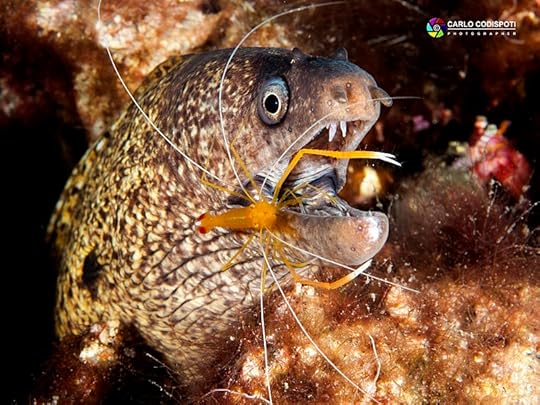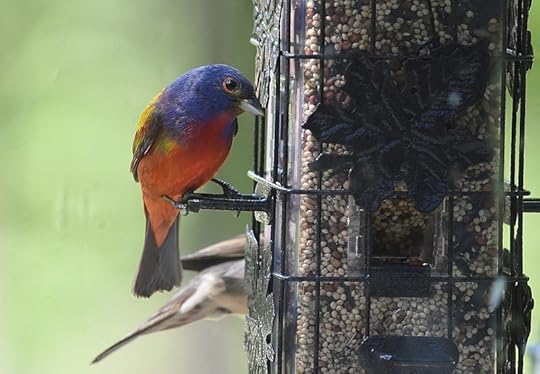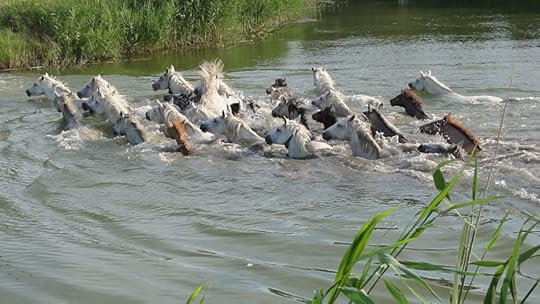426. Moray eels, Gregorian chants, and the Charlest
BROWDERBOOKS
Good news: My historical novel The Eye That Never Sleeps got a good review from Sublime Book Review. They call it a detective story enlivened with historical detail. I'm still waiting for that inevitable bad review that usually comes, sooner or later, but so far it hasn't happened. For all my books, go here.
As most of you know, I'm on Facebook. For my personal page, go here. For my business page, go here. And please, "like" the business page, if you can. Silly as it is, I'm trying to play the Facebook game, and "likes" are a part of it.
Upon reading my rant about Facebook not being a user-friendly site, my friend Patrick, who is Facebook-savvy, sent me this message: "I think what you've started to realize with Facebook is that they're there for their purposes, not for ours. (Wow, that sentence contained three homophones!)"
Point taken. And by the way, do you know what a homophone is? And if you do, what is a heterophone?
MORAY EELS, GREGORIAN CHANTS
AND THE CHARLESTON
This post will be a bundle of Fivesies -- things that come to me in fives.
FIVE WONDERS I WILL NEVER SEE
1. a coral reef2. a painted bunting3. Lake Tear of the Clouds, Feldspar Brook, and the Opalescent River4. wild horses galloping5. black ice rising from the polar sea
Commentary:
1. Jacques Cousteau has described coral reefs as resembling dwarf skulls, petrified mauve bushes, witches’ heads, white walking canes by the hundreds, and frozen parasols, inhabited by feather bonnets that explode into the stinging spines of the lion fish, and moray eels glowering from crevices and baring their savage teeth.
 andre oortgijs
andre oortgijsWho wouldn’t want to see such wonders, even at the risk of rapture of the depths, when the diver is tempted by mysterious populations still deeper, and risks madness and death.
 Moray eel
Moray eelCarlo Codispoti
2. In the opinion of many, our most beautiful bird, the male flaunting bold splotches of blue, green, and red. I have never seen him, since he disdains the usual south-to-north spring migration path of Eastern birds that brings them to the Ramble in Central Park and to me. Instead, he winters in southern Florida and points south, then migrates westward to the American Southwest, or to coastal Florida, Georgia, and South Carolina. And to make matters worse for birdwatchers, he is secretive and hard to observe.
 Andy Reago & Chrissy McClarren
Andy Reago & Chrissy McClarren3. The lake is the source of the Hudson River in the far north of the state, high in the Adirondacks. Water from the lake pours into the brook and the river. The very names of all three enchant me. (No illustration can match what I imagine.)
4. I have seen such horses in the 1953 French film Crin blanc (White Mane), which shows them galloping about the Camargue, a region in southern France bounded by the Mediterranean on the south, and the two arms of the Rhône delta. In the film the leader of the herd is a white-maned horse, hence the title. Unknown to tourists, the Camargue has lakes and marshlands that are a haven for wild birds, but also, as seen in the film, herds of wild horses, and the French cowboys that try to capture and tame them. Though I have never seen them, wild horses also run free in the American West, grazing belly-deep in tall grasses, often dotting the hills as far as the eye can see. Having removed them from public land, where their grazing has depleted the grasses, the Bureau of Land Management stores 46,000 of them on some 60 private ranches at a cost that eats up much of the Bureau’s budget. The horses’ natural enemies, wolves and mountain lions, have been eradicated, allowing the horses to reproduce to the point that the grasslands are overgrazed and in danger. But for me, an Easterner far removed from the West, wild horses suggest a magnificent force of nature that we humans have yet to subdue.
 Wild horses in the Camargue.
Wild horses in the Camargue.EmmaLouisa97
5. Such a phenomenon is described in Robert Macfarlane’s recent bestseller, Underland: A Deep Time Journey, of which I read a review. He saw a huge mass of black ice rise suddenly out of the Arctic sea, then sink again into the water, perhaps never to be seen again. (For more about him, see my post #416 and scroll down.)
 Polar ice, an 1874 illustration. But imagine it suddenly erupting
Polar ice, an 1874 illustration. But imagine it suddenly erupting from the depths of the sea.
MY FIVE GREATEST ACCOMPLISHMENTS
1. I can sing the Marseillaise in French.2. I can dance the Charleston.3. I can sing Lili Marlene in German.4. Singlehanded, I repaired a double-hung window.5. I learned the optative in Greek.
Commentary:
1. It’s easier on the voice than the Star-Spangled Banner. Oddly enough, I last sang it with new acquaintances following a sumptuous Thanksgiving dinner on Staten Island.
 Bastille Day, 2016. A band playing it on the Champs Elysées,
Bastille Day, 2016. A band playing it on the Champs Elysées, at the start of the annual parade.
2. Listen, at ninety that’s not bad. I learned it on YouTube.
 Teaching the Charleston to basketball players as an aid to the game, 1926.
Teaching the Charleston to basketball players as an aid to the game, 1926.Everyone was doing it. The instructor's cloche hat is unmistakably 1920s.
3. A song sung on both sides of the lines in Europe and North Africa during World War II. The British in North Africa got it from the Germans, and the GI’s got it from the British and brought it back here after the war. Many versions; I learned the original German one sung by Lale Andersen, first broadcast from Radio Belgrade in occupied Yugoslavia in 1941. Dietrich and others later did it in English. It's all about a woman who stands beneath a lamppost by a barracks gate, but no, she's not that kind of woman. It's all about wartime loneliness and longing.
 A German propaganda postcard, 1942. Illustration for the words
A German propaganda postcard, 1942. Illustration for the words "Underneath the lamppost / By the barracks gate ..."
4. Not once, but twice. I was replacing a broken sash cord with chain. The sash cord or chain lets you raise and lower the window. You have to remove some wood paneling to get at the cord or chain and fix it, and then replace the paneling. At times you’re tilting the whole window out of its frame. It’s a miracle I didn’t drop it out the open frame and send it crashing down to the street. I love the French name: fenêtre à guillotine.
 Just an ordinary window, but imagine taking it out of its frame.
Just an ordinary window, but imagine taking it out of its frame.5. You think the subjunctive in French or Spanish or Latin is hard? Classical Greek also has the optative. It’s like a second subjunctive. For example: Χαίροιμι ἄν, εἰ πορεύοισθε (I’d be happy, if you could travel).
FIVE THINGS I WISH I HAD DONE
1. Hiked the full length of the Appalachian Trail.2. Danced up a storm with Brooke Astor.3. Heard Lawrence Olivier in a famous double bill.4. Become friends with a young French student who had spent a year in the States. 5. Heard a Gregorian chant in an old French church, ideally Chartres cathedral.
Commentary
1. Over 2,000 miles long, it goes from Georgia to Maine. You start in Georgia in April, end up in Maine in October. You carry condensed food with you in your pack, let your hair grow wild, long for a hot shower. It's all up and down, strictly for twenty-year-olds. A day walker, I've done short stretches, including the Lemon Squeezer and the start of Agony Grind. Only the start of the Grind, a long, steep climb that lives up to its name.
 Endlessly through woods, and up and down and up and down and up.
Endlessly through woods, and up and down and up and down and up.Jason Hollinger
2. Known as the Aristocrat of the People, on her tours of schools, day-care centers, and homeless shelters in need of foundation money, she endeared herself to janitors and secretaries and guards. But in high-society gatherings at night, she flirted with every male in sight, and when she heard wild music pulsing through her, even in her eighties she danced up a storm. Our paths never crossed, but I have felt that music too and danced to it like crazy. Wild, mindless fun.
3. I never saw the performance, but heard about it from someone who had. As Oedipus, when blinded, he uttered a bone-chilling scream that left the audience stricken. Then, after an intermission, he came prancing onstage as a Restoration fop. For the friend who told me about it, it was the most unforgettable performance that he had ever seen.
4. A student at a lycée, he had just spent a year in the U.S. I met him at a party for foreign students in Lyons. When I asked him about his life in the States, he said, "La vie est plus large." Hard to translate: life here is broader, richer, less constricted. Regrettably, I never saw him again to ask him to explain in detail. He was quiet, self-contained, perhaps in the long run deep, and reluctant to risk his English in a public gathering. In private I could have encouraged him, become his friend. One of those should-have-beens that never was. My mistake, not his. Missed opportunities can haunt you for years.
5. I love Gregorian chants for their simplicity, no music other than the human voice. Two eighteenth-century parchments with the chants, which I got in Paris long ago, hang on my living room wall; with effort, I can translate the Latin words.

And I love Chartres cathedral for its sculpture and its breathtaking stained-glass windows. To experience the two simultaneously would be an unforgettable experience, but one that I have never achieved. But dreams live on, stubbornly, teasingly, poignantly.

Coming soon: Hot Silver
© 2019 Clifford Browder
Published on September 01, 2019 05:10
No comments have been added yet.



